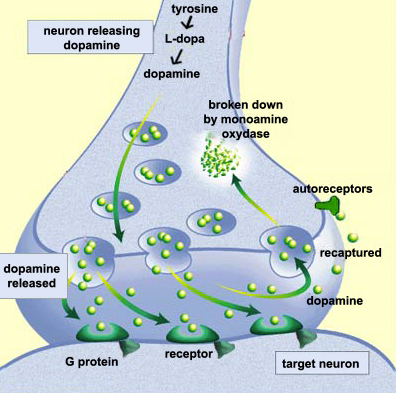by Nancy Uon
Many potential romances begin and end with the first date. The "date" usually involved some activity where both parties can get to know eachother by exchanging personal stories, comparing likes and dislikes and sharing a common experience, such as a movie, concert or a meal.
The success of a first date is usually determined by the feeling one or both of the parties have regarding future meetings.
"Would you like to go out again?"
New research has shed some light on things you should do, and not do, to make your "first date" experience a positive one, increasing the possibilities of a continuing relationship. It all has to do with a neurotransmitter called dopamine.
Dopamine is a neurotransmitter produced in several areas of the brain that is found in a wide variety of animals. Its role in reward learning and reward-seeking behaviour is well established by animal studies -- however, in humans its role is much less understood.
Put simply, when you do something that brings pleasure, that sensation of pleasure is linked to the increased activity of dopamine in your brain. So strong is the effect of dopamine that, even one good "rush" from a dopamine experience will cause the brain to anticipate and react positively to repeat the same experience.
For years, scientists have known that dopamine was linked to addictive drugs like cocaine, amphetamines and even alcohol. This chemical basis for our perception of pleasure is very strong and not easily overcome. Research with laboratory animals has suggested that human behavior might be influenced in lesser, more subtle ways also. Now a new study has demonstrated that dopamine can influence the small choices that people make by affecting their expectation of pleasure and this new research might well be utilized on your next "first date."
Dopamine and MAO
When dopamine is released it provides feelings of enjoyment and reinforcement to motivate us to do, or continue doing, certain activities. Dopamine is released by naturally rewarding experiences such as food and sex.
This pre-programmed reward system makes sure that people do eat, do desire to procreate, and basically survive. Without enough dopamine, people feel the opposite of enjoyment and motivation -- they feel fatigued and depressed, and experience a lack of drive and motivation.
Brain chemicals, including dopamine, are stored in cells, which you can think of like barrels full of that chemical. When something occurs like a good meal or great sex the brain pours out some dopamine from the dopamine barrels into an open space in the brain called a "synapse". It floats around there.
Across the synapse from the barrels of dopamine are dopamine receptors. These dopamine receptors have special places where only Dopamine will fit, like a lock and key.
As the Dopamine floats around in the synapse, it finds the dopamine receptors, and "plugs in" to them. THIS is the point where we feel good. "Pleasure" is when the dopamine is locked in a receptor. There are, however, a limited number of dopamine receptors available, and each receptor has a limited capacity to accept dopamine molecules. So some of the dopamine may not be able to find a receptor.
When all the dopamine receptors are full, the remaining dopamine that didn't find a receptor is normally recycled. There are "reuptake molecules" that do this by taking the unused dopamine back to where it was originally stored. Other molecules break down the dopamine in a process called oxidation.
One of the chemicals that breaks down the dopamine is called Mono-Amine-Oxidase or MAO. This is a protein found in the liver and brain that breaks down dopamine so a person is not feeling pleasure all the time. In psychiatry, MAO-inhibitors are sometimes used to slow this action in depressed patients, allowing the dopamine and other neurotransmitters to build up in the synapse.
Drugs like prozac and zoloft, anti-depressants, perform this same inhibition with seratonin, another neurotransmitter.
Certain foods and spices can naturally inhibit MAO and thus increase dopamine.
Nutmeg has been used for decades by prisoners as a euphoric substance. When a tablespoon of powder is ingested it produces strong pleasurable sensations for up to 48 hours. The effects are described as very similar to MMDA ("Ecstacy"). When used in combination with dopamine rich foods the effect can be very pronounced.
Dopamine Enhances Expectation of Pleasure in Humans
In a study, published in Current Biology, the research team examined estimated pleasure of future events before and after the administration of a drug called L-DOPA, which is known to enhance dopamine function in the brain. L-DOPA is a prescription drug commonly used to treat patients with Parkinson's disease.
The 61 study participants were asked to rate their expectations of happiness if they were to holiday at each of 80 destinations, from Thailand to Greece. They were then given L-DOPA or a placebo (fake pill) and asked to imagine enjoying a holiday in those destinations.

The following day participants had to pick between a series of paired destinations that they had initially assigned with equal ratings, one member of the pair was imagined under L-DOPA the day before and the other under placebo. Finally, they rated the full set of 80 destinations again.
Ratings for particular destinations increased after they were imagined under L-DOPA's influence. That increase also affected the participants' selections the following day. Dr Sharot, the scientist who ran the studies, said, "We had reason to believe that dopamine would enhance expectations of pleasure in humans, but were surprised at the strength of this effect. The enhancement lasted at least 24 hours and was evident in almost 80 per cent of the subjects."
What appear to have happened here was that the elevated levels of dopamine in the brain of the people who were given L-DOPA caused them to associate certain choices (in this case the destination of a holiday) with the feeling of pleasure. The following day, when they were asked to rate a destination that was imgined under the influence of this dopamine-high, they rated it as more attracive and desirable.
Fast forward to the "day after" a first date. If only the same dopamine-high could influence that expectation of future pleasure... Well, there is possibly a way.
Certain foods are known to enhance and diminish dopamine production. Unfortunately they are not the usual menu on a typical date -- unless you decide to visit a salad or suchi bar. You might want to dine at home and prepare a dish containing some of the following foods:
Foods That Help To Increase Dopamine And Norepinephrine Naturally!
The Appetizer
How about a nice fruit cup?

Apples: A compound found in apples called "quercetin' is an antioxidant that studies have shown may not only help in the prevention of cancer but may also play an important role in the prevention of neurodegenerative disorders. There may be something to that old saying, "An apple a day keeps the doctor away..."
Bananas and Avacados: A banana is a good source of tyrosine. So is an avocado. Tyrosine is the amino acid neurons need make norepinephrine and dopamine.
Watermelon: Watermelon juice is fat free and loaded with vitamins A, B6, and C and is used by the body to manufacture neurotransmitters such as serotonin, melatonin, and dopamine.
The Entrée

Chicken & Turkey: Chicken and turkey meat, like eggs, contains complete low-fat protein source that increases levels of neurotransmitters norepinephrine and dopamine.
Chicken is also a good source of coenzyme Q10 (Co Q10), which increases the energy generating potential of neurons.
As you will see further down in this article, wheat-germ and almonds are also rich in tyrosine, an amino acid that produces dopamine. Why not try a fried chicken breast coated with chopped almonds and wheat-germ?
Cheese & Yogurt: Dairy products are a well known protein foods, rich in tyrosine, which helps produce dopamine. Eggs: Research from the University of California, Berkeley suggests that people who suffer from depression have low amount of dopamine in their brains. One food to increase dopamine is a serving of protein-rich eggs. The eggs can be incorporated in just about anything baked.
Fish: Omega-3 fatty acids are found in seafood, especially mackerel, salmon, striped bass, rainbow trout, halibut, tuna, and sardines. These fatty acids may have many jobs in the body, including the production of neurotransmitters, such as dopamine.
You might consider taking a date to a Sushi restaurant. Many types of seaweed are also rich in nutrients that promote dopamine.
Beets: Betaine, an amino acid naturally present in certain vegetables, particularly beetroot (beets), is an antidepressant of the first order. Betaine acts as a stimulant for the production of SAM-e (S-adenoslmethionine) which is directly related to the production of dopamine and serotonin.
Whole grain bread is also rich in amino acids, like tyrosine.
Soy beans are also rich in tyrosine, an amino acid that increases dopamine production.

Tofu is a wonderful food, made from soy, which can be cooked in may different ways and flavored to resemble meats. It is a staple for vegetarians and Asians, especially Japanese, and can be served with other dopamine rich foods such as beets, crushed almonds and even fried bananas.
Hey, you might want to make this dinner yourself to get the full benefits of a dopamine-high!

Wheat Germ: Wheat Germ is a good source of Phenylalanine. Phenylalanine is an essential amino acid found in the brain and blood plasma that can convert in the body to tyrosine, which in turn is used to synthesize dopamine.
Almonds: This nut in particular is a rich source of tyrosine, which increased dopamine production.
Things to avoid:
Alcohol, red meat, caffeine, and sugar all deplete the brain of dopamine. So forget the usual strategies of booze, a good prime rib followed by strawberry shortcake.
You may feel good at the time but the next day will leave you withh less dopamine, cash or chances for a second date.
Lead author Dr Tali Sharot, Wellcome Trust Centre for Neuroimaging at UCL, said:
"Humans make much more complex decisions than other animals -- such as which job to take, where to go on holiday, whether to start a family -- and we wanted to understand the role of dopamine in making these types of decisions. Our results indicate that when we consider alternative options when making real-life decisions, dopamine has a role in signalling the expected pleasure from those possible future events. We then use that signal to make our choices."

















 Apples: A compound found in apples called "quercetin' is an antioxidant that studies have shown may not only help in the prevention of cancer but may also play an important role in the prevention of neurodegenerative disorders. There may be something to that old saying, "An apple a day keeps the doctor away..."
Apples: A compound found in apples called "quercetin' is an antioxidant that studies have shown may not only help in the prevention of cancer but may also play an important role in the prevention of neurodegenerative disorders. There may be something to that old saying, "An apple a day keeps the doctor away..." Chicken & Turkey: Chicken and turkey meat, like eggs, contains complete low-fat protein source that increases levels of neurotransmitters norepinephrine and dopamine.
Chicken & Turkey: Chicken and turkey meat, like eggs, contains complete low-fat protein source that increases levels of neurotransmitters norepinephrine and dopamine. 

 Wheat Germ: Wheat Germ is a good source of Phenylalanine. Phenylalanine is an essential amino acid found in the brain and blood plasma that can convert in the body to tyrosine, which in turn is used to synthesize dopamine.
Wheat Germ: Wheat Germ is a good source of Phenylalanine. Phenylalanine is an essential amino acid found in the brain and blood plasma that can convert in the body to tyrosine, which in turn is used to synthesize dopamine..bmp)










.bmp)